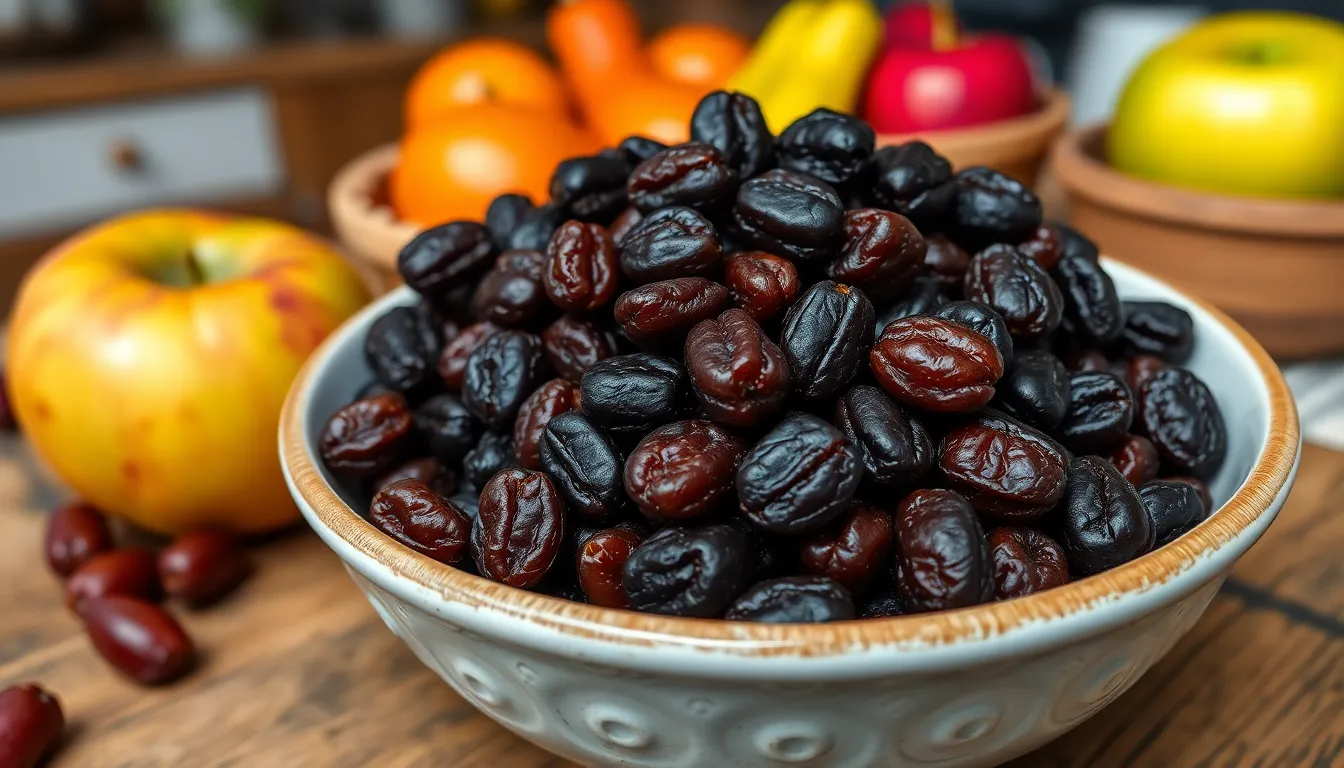Table of Contents
ToggleConstipation can be an uncomfortable and frustrating experience, often leading people to seek natural remedies. Among these remedies, raisins have gained attention for their potential benefits. Packed with fiber, vitamins, and minerals, these dried grapes may offer more than just a sweet snack.
Raisins contain sorbitol, a natural sugar alcohol known for its laxative effects. This, combined with their high fiber content, makes them a popular choice for those looking to improve digestive health. But do they really work? Exploring the relationship between raisins and constipation can shed light on whether this tasty treat deserves a spot in your diet for better bowel health.
Are Raisins Good for Constipation?
Raisins provide notable benefits for alleviating constipation. High fiber content, approximately 3.7 grams per ounce, aids in promoting regular bowel movements. Fiber increases stool bulk, helping to soften it, which can prevent discomfort during defecation.
Raisins contain sorbitol, a natural sugar alcohol that functions as a gentle laxative. Sorbitol attracts water into the intestines, enhancing moisture and facilitating smoother passage of stool. An ounce of raisins often delivers about 0.6 grams of sorbitol.
Incorporating raisins into meals or snacks can enhance overall digestive health. For instance, adding raisins to cereals, salads, or baked goods increases fiber intake while benefiting digestion.
Raisins also supply essential nutrients, such as potassium and magnesium, which play crucial roles in maintaining muscle function within the digestive system. Adequate potassium levels support smooth muscle contractions that aid in bowel movements.
Overall, including raisins in a balanced diet supports digestive health and may provide relief from constipation.
Nutritional Profile of Raisins

Raisins offer a rich nutritional profile that supports digestive health, particularly in alleviating constipation through their fiber and nutrient content. Their unique composition makes them a valuable addition to a balanced diet.
Fiber Content
Raisins contain approximately 3.7 grams of dietary fiber per ounce. This fiber helps increase stool bulk, promoting regular bowel movements. The insoluble fiber aids in adding bulk to waste, while soluble fiber softens stool, making it easier to pass. Consuming fiber-rich foods like raisins contributes to overall digestive health and can help alleviate symptoms of constipation effectively.
Other Nutrients
Raisins also provide essential nutrients that support bodily functions beyond digestion. Key nutrients include:
- Potassium: Approximately 288 mg per ounce supports muscle and nerve function, including the muscles involved in digestion.
- Magnesium: Roughly 18 mg per ounce plays a vital role in muscle contraction and relaxation, aiding in the movement of food through the digestive tract.
- Iron: Contains about 0.81 mg per ounce, helping with oxygen transport and energy production, promoting overall health.
These nutrients collectively contribute to better digestive function, enhancing the potential relief from constipation when raisins are incorporated into the diet.
Health Benefits of Raisins
Raisins offer numerous health benefits, particularly for digestive health. Their rich nutritional profile contributes positively to overall well-being.
Digestive Health
Raisins significantly enhance digestive health. They contain around 3.7 grams of fiber per ounce, promoting regular bowel movements. Insoluble fiber adds bulk to stool, while soluble fiber helps soften it, facilitating easier passage. The sorbitol in raisins attracts water into the intestines, which aids in moisture retention and ensures smoother stool movement. Regularly incorporating raisins into meals, such as cereals, salads, or baked goods, can further support bowel health and relieve constipation symptoms.
Antioxidant Properties
Raisins are rich in antioxidants, which provide further health benefits. These antioxidants, including flavonoids and polyphenols, combat oxidative stress and reduce inflammation within the digestive tract. The presence of these compounds can enhance gut health by protecting cells from damage and supporting overall gastrointestinal function. Antioxidants also contribute to overall health, bolstering the immune system and promoting longevity.
How Raisins Help Relieve Constipation
Raisins offer multiple benefits for alleviating constipation due to their rich fiber content and other key components. These natural foods enhance digestive health and support regular bowel movements.
Mechanism of Action
Raisins relieve constipation primarily through their fiber and sorbitol content. Fiber, approximately 3.7 grams per ounce, increases stool bulk and promotes regularity. Insoluble fiber adds necessary volume, while soluble fiber helps soften stool for easier passage. Sorbitol acts as a natural laxative by drawing water into the intestines, increasing moisture, and facilitating smoother stool movement. Additionally, the antioxidants found in raisins protect gut cells from oxidative damage, further supporting digestive function.
Recommended Serving Size
For optimal benefits, a serving size of 1 to 2 ounces of raisins daily can be effective. This amount provides about 3.7 to 7.4 grams of fiber, aiding in digestion and relieving constipation. Incorporating raisins into meals or snacks—such as cereals, salads, or baked goods—ensures sufficient fiber intake while enhancing nutritional value.
Potential Side Effects
Raisins, while beneficial for digestive health, can cause side effects in some individuals. Common concerns include:
- High Fiber Intake: Excessive consumption of raisins can lead to bloating, gas, and abdominal discomfort due to their high fiber content. Limiting intake to 1 to 2 ounces daily minimizes these risks.
- Sugar Content: Raisins contain natural sugars, approximately 29 grams per ounce. Overeating may result in fluctuating blood sugar levels, which is a concern for individuals with diabetes or insulin sensitivity.
- Caloric Density: Each ounce of raisins contains about 85 calories. Consuming large quantities can contribute to excess caloric intake, possibly leading to weight gain if not balanced with physical activity.
- Allergic Reactions: Though rare, some individuals may experience allergic reactions to raisins, resulting in symptoms such as itching, swelling, or gastrointestinal distress.
- Sorbitol Sensitivity: The sorbitol in raisins can cause diarrhea in sensitive individuals, especially when consumed in large amounts. Moderation is essential to avoid discomfort.
Monitoring sensitivity and adjusting portion sizes helps prevent these potential adverse effects while reaping the benefits of raisins for constipation relief.
Raisins can be a valuable addition to a diet aimed at relieving constipation. Their high fiber content combined with sorbitol offers a natural solution for promoting regular bowel movements. By incorporating a moderate amount of raisins into daily meals or snacks, individuals may experience improved digestive health and enhanced overall well-being.
While they provide numerous benefits, it’s important to consume them in moderation to avoid potential side effects. Balancing raisin intake with other fiber sources and maintaining hydration can further support digestive function. With mindful consumption, raisins can play a significant role in achieving better bowel health.




